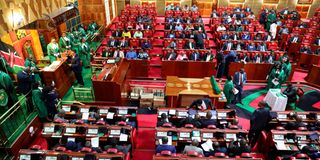Kenya must develop reparations policies, laws

The Majority and Minority parties in Parliament play a decisive role in committee chairperson appointments. Women have borne the brunt of Dr Ruto’s falling-out with Gachagua.
What you need to know:
- Equally important is the need for the government to expedite the compensation payments to victims who have successfully sued the State and operationalise the Restorative Justice Fund.
The 2007-2008 post-election violence was a dark moment in Kenya’s history, resulting in the deaths of over 1,200 Kenyans and displacing more than 650,000 people.
The quest for justice has been a bumpy ride, leaving many victims devastated.
In 2014, Dr Keriako Tobiko, who was then the Director of Public Prosecutions, dropped over 4,000 criminal cases, including alleged acts of rape, murder and arson. He argued that these cases did not meet the necessary prosecutorial threshold.
At the International Criminal Court, the Kenyan cases ultimately collapsed due to witnesses recanting their statements and Kenya’s failure to cooperate with the court.
The Kenya Human Rights Commission and 28 petitioners, on November 24, 2011, filed a suit against the State seeking to enforce the fundamental rights of internally displaced persons violated during the post-election violence. Thirteen years later, this case remains unresolved.
A significant judgment was issued by the High Court on December 10, 2020, in Constitutional Petition No. 122 of 2013. The court found the government responsible for failing to conduct independent and effective investigations and prosecutions of sexual and gender-based violence crimes during the clashes.
The issuance of a public apology for all State injustices committed since independence, and the announcement of a Sh10 billion Restorative Justice Fund for victims of past violations by President Uhuru Kenyatta was intended to signify the beginning of a new era of reparations.
However, 10 years later, this fund is yet to be operationalised. Although there were efforts in 2017 to develop regulations and a draft policy, progress has been hindered by a lack of political goodwill.
Subsequent governments, including the current Kenya Kwanza administration, have pledged to enact policies and legislation aimed at providing for reparations. However, more than two years into President William Ruto’s regime, this promise remains unfulfilled.
The normalisation of violations by State agencies, particularly the police, has been a defining feature of Kenya’s governance since independence. Many victims of serious human rights violations have yet to receive any form of reparations and assistance from the state.
Parliament needs to urgently enact legislation that provides for reparations for these violations. The Executive should strengthen existing accountability frameworks to ensure that perpetrators held accountable for their actions and inactions.
Equally important is the need for the government to expedite the compensation payments to victims who have successfully sued the State and operationalise the Restorative Justice Fund.
Mr Mavenjina works with the Kenya Human Rights Commission. mmavenjina@khrc.or.ke.

